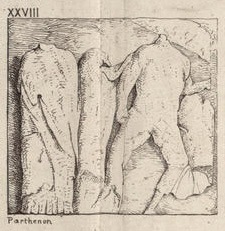Chapter 17, The Return from Troy
Previous Page Table of Contents Next Page
♦ Naples, Museo Nazionale 81669 (H2422): Attic red-figure hydria by Kleophrades Painter with Sack of Troy, including armed Aineias carrying Anchises, with Askanios leading the way (for rescue of aged Aithra by her grandsons Demophon and Akamas from same vase, see Gantz page 658; for Kassandra and Aias from same vase, see Gantz page 655; and for the death of Priam, see Gantz page 657 upper)

A. Furtwaengler and K. Reichhold, Griechische Vasenmalerei: Auswahl hervorragender Vasenbilder (Serie I, 1904), pl. 34 (detail)
Beazley Archive Pottery Database
♦ Acropolis Museum, Akr. 20215: damaged Pentelic marble metope from Parthenon, north 28: armed Aineias on right, who protects his son Askanios with his shield while he guides his blind father; a female figure on the left, who may be Aphrodite or Kreousa

Akropolis Museum, image from C. Praschniker, Parthenonstudien (1928) pl. 9

A. Michaelis [Editor], Der Parthenon (Tafeln, 1870) pl. 4 (detail)

Digital LIMC (see Scene 1, Aineias 156), no image
♠ Dionysios of Halikarnassos, Roman Antiquities 1.46-59 – Dionysius of Halicarnassus: Roman Antiquities, Vol. 1, pp. 144-99, ed. E. Cary. Cambridge 1937.
When Troy had been taken by the Achaeans, either by the stratagem of the wooden horse, as Homer represents, or by the treachery of the Antenoridae, or by some other means, the greatest part of the Trojans and of their allies then in the city were surprised and slain in their beds; for it seems that this calamity came upon them in the night, when they were not upon their guard. But Aeneas and his Trojan forces which he had brought from the cities of Dardanus and Ophrynium to the assistance of the people of Ilium, and as many others as had early notice of the calamity, while the Greeks were taking the lower town, fled together to the stronghold of Pergamus, and occupied the citadel, which was fortified with its own wall; here were deposited the holy things of the Trojans inherited from their fathers and their great wealth in valuables, as was to be expected in a stronghold, and here also the flower of their army was stationed. [2] Here they awaited and repulsed the enemy who were endeavouring to gain a foothold on the acropolis, and by making secret sallies they were able, through their familiarity with the narrow streets, to rescue the multitude which was seeking to escape at the taking of the city; and thus a larger number escaped than were taken prisoner. But with respect to the future he reasoned very properly that it would be impossible to save a city the greater part of which was already in possession of the enemy, and he therefore decided to abandon the wall, bare of defenders, to the enemy [3] and to save the inhabitants themselves as well as the holy objects inherited from their fathers and all the valuables he could carry away. Having thus resolved, he first sent out from the city the women and children together with the aged and all others whose condition required much time to make their escape, with orders to take the roads leading to Mount Ida, while the Achaeans, intent on capturing the citadel, were giving no thought to the pursuit of the multitude who were escaping from the city. Of the army, he assigned one part to escort the inhabitants who were departing, in order that their flight might be as safe and free from hardships as the circumstances would permit; and they were ordered to take possession of the strongest parts of Mount Ida. With the rest of the troops, who were the most valiant, he remained upon the wall of the citadel and, by keeping the enemy occupied in assaulting it, he rendered less difficult the flight of those who had gone on ahead. [4] But when Neoptolemus and his men gained a foothold on part of the acropolis and all the Achaeans rallied to their support, Aeneas abandoned the place; and opening the gates, he marched away with the rest of the fugitives in good order, carrying with him in the best chariots his father and the gods of his country, together with his wife and children and whatever else, either person or thing, was most precious. Continue Reading Greek Text and English Translation
♠ Sophokles, Laokoon fr 373 R – Tragicorum Graecorum Fragmenta 4, pp. 332-33, ed. S.L. Radt. Göttingen 1977.
♠ Hellanikos, Troika 4F31 – Die Fragmente der griechischen Historiker 1, pp. 115-17, ed. F. Jacoby, 2d ed. Leiden 1957.
Previous Page Table of Contents Next Page
Tags:
Artistic sources edited by Frances Van Keuren, Prof. Emerita, Lamar Dodd School of Art, Univ. of Georgia, November 2022
Literary sources edited by Elena Bianchelli, Retired Senior Lecturer of Classical Languages and Culture, Univ. of Georgia, April 2023
228 total views, 1 views today